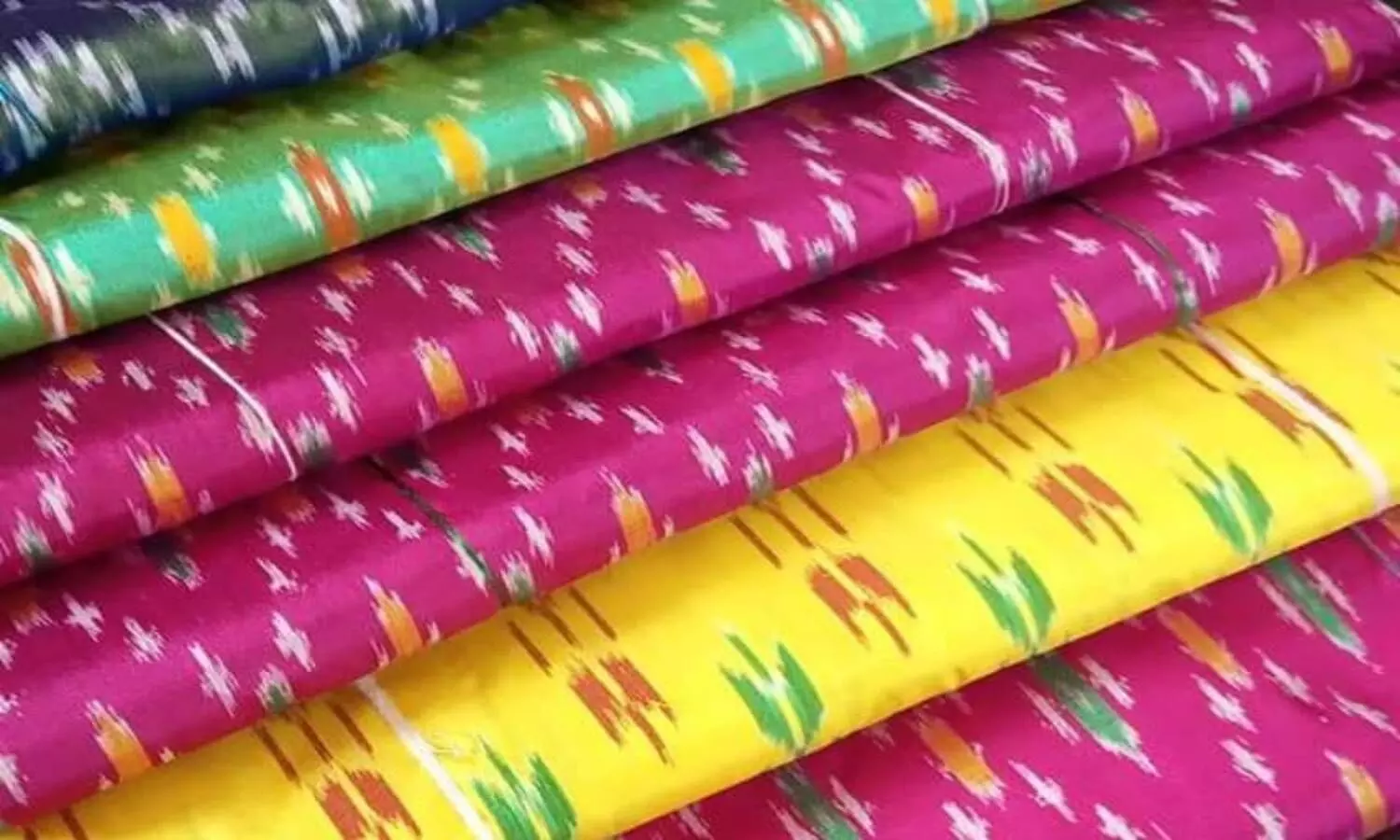`Dear Pochampally sarees become dearer': Weavers fear job cuts as demand drops
Subdued demand has hit the saree weaving industry in Pochampally. What has created a peculiar situation is that the production cost has pushed the prices further up.
By Nimisha S Pradeep
Naveena Ghanate, an Ikat lover, is not interested in buying Pochampally Sarees anymore. Reason: There are no occasions to wear them given the pandemic and lockdown.
"My purchases have been reduced due to the restrictions for the past two years. We hardly have any events planned," says Naveena Ghanate, a regular customer of Pochampally Sarees in Hyderabad.
Like Naveena, many women have put off their plans of buying Pochampally Sarees simply because there are no occasions, parties, or events lined up.
Subdued demand has hit the saree weaving industry in Pochampally. What has created a peculiar situation is that the production cost has pushed the prices further up.
"The starting price of a Pochampally silk saree was Rs.5000 before Covid-19, but now it has increased to Rs. 7000. As a result, we have lost our old customers. They are complaining that the prices were much less previously," says Bhanu, who owns the Balaram Handlooms in Pochampally.
No celebration, No sarees
When Covid-19 hit the country, the focus was on food and medicine, whereas clothing was considered a non-essential commodity. Besides, as there were no more parties or functions because of lockdown, people hardly felt the need to buy a Pochampally Saree or any other party wear for that matter.
Like many other sectors, the handloom market too was affected by the lockdown.
With people losing their jobs and livelihood, the purchasing power of the people also reduced drastically during the Covid pandemic.
"There were no retail exhibitions. A large chunk of our products were sold. But due to Covid, all these events got canceled leaving no buyers for our products," says Sudha Mullapudi, who owns Abhihara, a small enterprise at Pochampally.
Rising Yarn Rates
One of the biggest issues faced by Pochampally weavers is the lack of availability of cheap raw silk. "Before Covid-19, we used to get raw silk at Rs 2500 from China and Bangalore. But with a ban on the import of Chinese silk, Bangalore has become the sole seller and as a result, the prices are double now, around Rs.5000," says Bhanu.
Sudha also says that there is a lack of sufficient in-house production of yarn which is pushing its prices up.
"There is a 35%-40% increase in the price of raw yarn. But, we cannot increase the price of the sarees," says Sudha.
Another reason for the rise in yarn prices is the reduced investment. With a lot of stock already piling in their sheds, entrepreneurs are no more interested and also not confident of investing in yarn. They fear finished products may go unsold. These are the tremors Covid-19 left on them.
Also, many small enterprises and master weavers have scaled down their business, and hence their investment too. "A master weaver at Abhihara earlier had 200 looms but now he has only 60 looms," says Sudha.
Another reason that Sudha notes is the increasing petrol diesel prices. "Raw materials brought from Bangalore are mostly transported by road. The transportation cost has increased due to the rise in petrol-diesel prices," she says.
The price rise of the raw materials and the sharp decline in the demand for the finished products have hit small enterprises like Abhihara badly. "Now, it is all about sustaining and surviving. We are trying to diversify and expand not just sticking to Pochampally products," says Sudha.
Pochampally Saree price rise and the subdued demand have affected the weavers severely.
Punna Suryanarayanan aka Suresh, a weaver lives in Koyyalagudem, a village 10kms away from Pochampally. The Ikkat culture has penetrated into this village too with over 200 families entirely dependent on weaving for a livelihood. But the warps and wefts that they do day and night do not fetch them a decent livelihood.
Suresh has been into weaving for the last twenty years. His wife is also engaged in the saree-making process. From processing the yarn to weaving and dying, Suresh's family does it all. His wages are calculated for a set of seven sarees. For the initial three sarees, an advance amount is given and for the rest four, the payment is made after completion. For making seven sarees which takes 25 days, they earn Rs 10000 to Rs 12000.
"Rs 10000 or Rs 12000 bahut kam hein, par kharcha bahut hote hein," says Suresh.
He says that it's very hard to manage their monthly expenses with the meager wages that they receive.
Suresh notes that the GST of raw material has also increased. "Earlier, the GST on cotton was 5% but now it is 12%," says Suresh.
With threat of the Omicron looming large, weavers and small entrepreneurs of Pochampally fear they may become jobless again. "Some retail events have been scheduled for this December. But I am still not sure if they'll happen," adds Sudha.